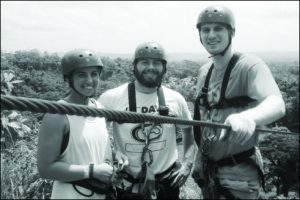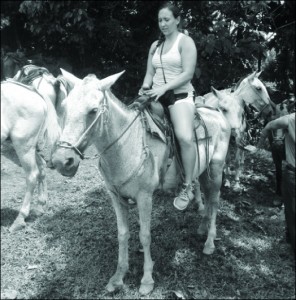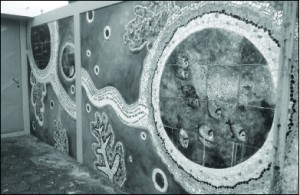By Marissa Alfano
Editor-in-Chief
Through the program Beyond Study Abroad, four OWU student athletes visited Costa Rica this summer, immersing themselves in the culture while taking classes, volunteering and training for their sport. 
Beyond Study Abroad is a program designed specifically for student athletes to have the opportunity to study abroad while continuing off-season training for their sport. Although participants do not have to be varsity athletes, a passion for athletics and a drive to connect the globe through sports is necessary, according to the program’s mission statement.
Former student athletes from Willamette University in Oregon developed the program. All of the directors played sports there and said they understand the need for a program for athletes that builds training into their daily schedules instead of having to fit it in on their own.
While in Costa Rica, students could take classes at either Veritos University or the University of Costa Rica and had a trainer who would help them with specialized sports workouts. Participants stayed with a host family and traveled the country on weekends. Over the summer, a total of 25 students stayed in Costa Rica.
Senior Erika Reese participated in the program this summer for the second consecutive time. She said last year she received an E-mail from her softball coach that initially drew her to the program. This year, she said she wanted to intern in Costa Rica and experience more of everyday Costa Rican life.
“Coming to Costa Rica the second time, I was not as culture-shocked,” Reese said. “The first time I was in awe of this incredible, new place and it was a hard, but good experience.
“Last year I went with my best friend, but this year I was more on my own. I was able to experience what living there would really be like since the novelty had time to wear off. I realized I could do it; I could live in a developing Latin American country.”
Reese interned this summer as a student faculty member, acting as a liaison between students and faculty in the program. She said she was students’ first resource in case any problems arose and was in charge of planning weekend excursions around the country.
Junior Erin Vassar also returned to Costa Rica for the second time this summer. She said she heard about the program from her swim coach, who sent out an e-mail about the opportunity. She said she wanted to study abroad and train while in another country and the program would allow her to do so for a little over a month.

“This time I was a lot more interested in the culture, “ Vassar said. “I was never confident in Spanish class, but I spoke the language with my host family. The thing is, you can go there and not connect with your host family or you can make mistakes and learn and embrace the experience and it’s fun. They helped me conjugate verbs or movie subtitles and vocabulary and I helped them with their English.”
Senior Marshall Morris visited Costa Rica for the first time through the program. He said he also heard about the program through Reese, a friend of his since freshman year. He said she told him the experience was amazing and that he should consider the program.
“I have always wanted to go abroad, but never was able to because basketball season spans spring and fall, which only leaves summer and I never wanted to sacrifice a month of off-season training,” Morris said. “Once I learned I could be abroad, experience culture, train for basketball and take a Spanish course, I realized the program was everything I wanted.”
Morris said his typical day in Costa Rica consisted of his intermediate Spanish class, a workout with an individual basketball program and group lifting and circuit training with a personal trainer.

“The kids came to associate our group with playing and having fun,” Morris said. “Their eyes would light up when they saw us walking down the street to play with them or to coach them in their sports.”
The student athletes all said they had wonderful experiences with their host families in Costa Rica.
Vassar said she came to love her host family and her host mom would do anything for her: she cooked, did laundry, made her bed and accepted her whole-heartedly.
Vassar said the program gave her host family an allowance to feed her breakfast and dinner, but they told her, “you are our sister, this is our family and what is ours is yours. We will feed you. Be comfortable. Eat if you are hungry; drink if you are thirsty.”
She said it was difficult to adjust, but once she did she felt comfortable and at home.
“It is hard to get used to not asking to shower in their home and just doing it because it’s your home, too,” Vassar said. “It was hard for me not to constantly say thank you or I’m sorry. My family always told me ‘tranquila,’ which means relax.”
“Their catch phrase was pura vida, which means pure life. It is more than that, though. It is a way of life.”
“In Costa Rica, there is no need to rush,” Vassar said. “Being a minute late is nothing there. You have to allow the connection and once that happens they literally became your family.”
Vassar said she formed a close bond with her family and could barely stand to leave them when the time came for her to return to the States.
“I was there for a month and was tired and missed home, but leaving was incredibly hard,” Vassar said.” I cried the day I was supposed to leave. My host family sat me down and said, ‘we love you. It is ok. You have to go. Life goes on.’ Everyone was bawling and it was really emotional. I love them. When there was an earthquake on Sept. 5, I talked to my family to make sure they were okay.”
Reese said she lived with her host family from last year, whom she never thought she would see again. Her host family consisted of a single mother, Maribel, an older brother named Josue and a younger sister named Carla.
“My host mom runs her own business and life is tough,” Reese said. “Carla wants to have her own job like her mom and not rely on a man, which is not common in Costa Rica. My host mom has received a lot of criticism because it is not typical to have a working single mom, but I admire her for it and loved getting to see the family again.”
Reese said, for her, the people in Costa Rica were the most enjoyable aspect of the trip.

In addition to seeing the good side of people, Reese said she was able to experience first-hand what being a minority in a country felt like. She said she thinks it was a good experience everyone should have.
“It is challenging to be a not well liked minority,” Reese said. “Costa Ricans have some animosity toward the States. Our wastefulness bothers them. They use everything and don’t throw anything away. They have tiny trashcans. At the same time, they know that America helps them out; the economic gap is so huge, though.”
Morris agreed, saying that the people are nice, but they want to know that Americans understand their way of life.
“The people in general were a lot nicer than you could imagine,” Morris said. “They are a little skeptical of the States and tend to think Americans are just tourists who do not understand them, but once they realize you are there to learn, they are the nicest people in the world. You really become a part of the Beyond Study Abroad family, your host family and of Costa Rica itself.”
Morris said he had to bring back materials from his class in Costa Rica for the department board to review and decide if the course was extensive enough to receive credit. He said he should know by mid-semester if he will be receiving credit or not.
Summer study abroad programs are not part of the eight semesters of the regular undergraduate year and financial aid does not transfer. It entails different procedures becasue nonterm additional courses need to be pre-approved and then transferred in and handled by the registrar.
Morris said he is currently trying to talk with OWU’s international affairs office and modern foreign language department to make the program recognized by the school. If this were to happen, the process of receiving class credit would be drastically shortened.
“It is hard because other programs have agreements with OWU for Spanish programs that are encouraged by the school to students,” Morris said.
“Regardless, the most important thing is speaking the language. I want to second major in Spanish, but I would be happy without a major because I am now very confident in my speaking skills, which is so much more valuable than receiving credit.”
Vassar said she agrees with Morris that her Spanish has improved much more than it ever would have if she had not gone to Costa Rica.
“I learned more by immersing myself in the culture than I ever could by being in class,” Vassar said. “When we traveled on the weekends, I asked basic questions in Spanish. I am more comfortable trying and speaking and making mistakes. The biggest advice I got from people in the program was not to just hangout in the office with a TV and Internet. They said you could make yourself not learn. You have to want to immerse yourself and learn. I can honestly say I went into the experience whole-heartedly.”
Morris said he could not be happier with his abroad experience and thinks he did everything the way it was supposed to be done.
“I’d like to think I did the program the way it was meant to be done,” Morris said. “I exhausted every opportunity I had while I was there. I did all the silly events like taking free dance classes and learned to salsa dance with the people there, eliminating barriers. The experience was everything I could have wanted.”
“I never understood peoples’ infatuation with the country they came back from studying abroad in, but now I completely understand it. I understand why people fall in love with other countries. It is truly eye opening to see from the inside out rather than from the outside in of another country.”
Morris said he would like to go back to Costa Rica after this year to refine his Spanish abilities.
“I will graduate with a major, but I would love to continue learning and possibly work with new students coming into the program,” Morris said. “I am so excited about the time I had and ready to talk about it because I know anyone else who goes will have the same great time as I did.”
Reese said she hopes to recruit more people from OWU to participate in Beyond Study Abroad and to make OWU a bigger part of the program each year.
